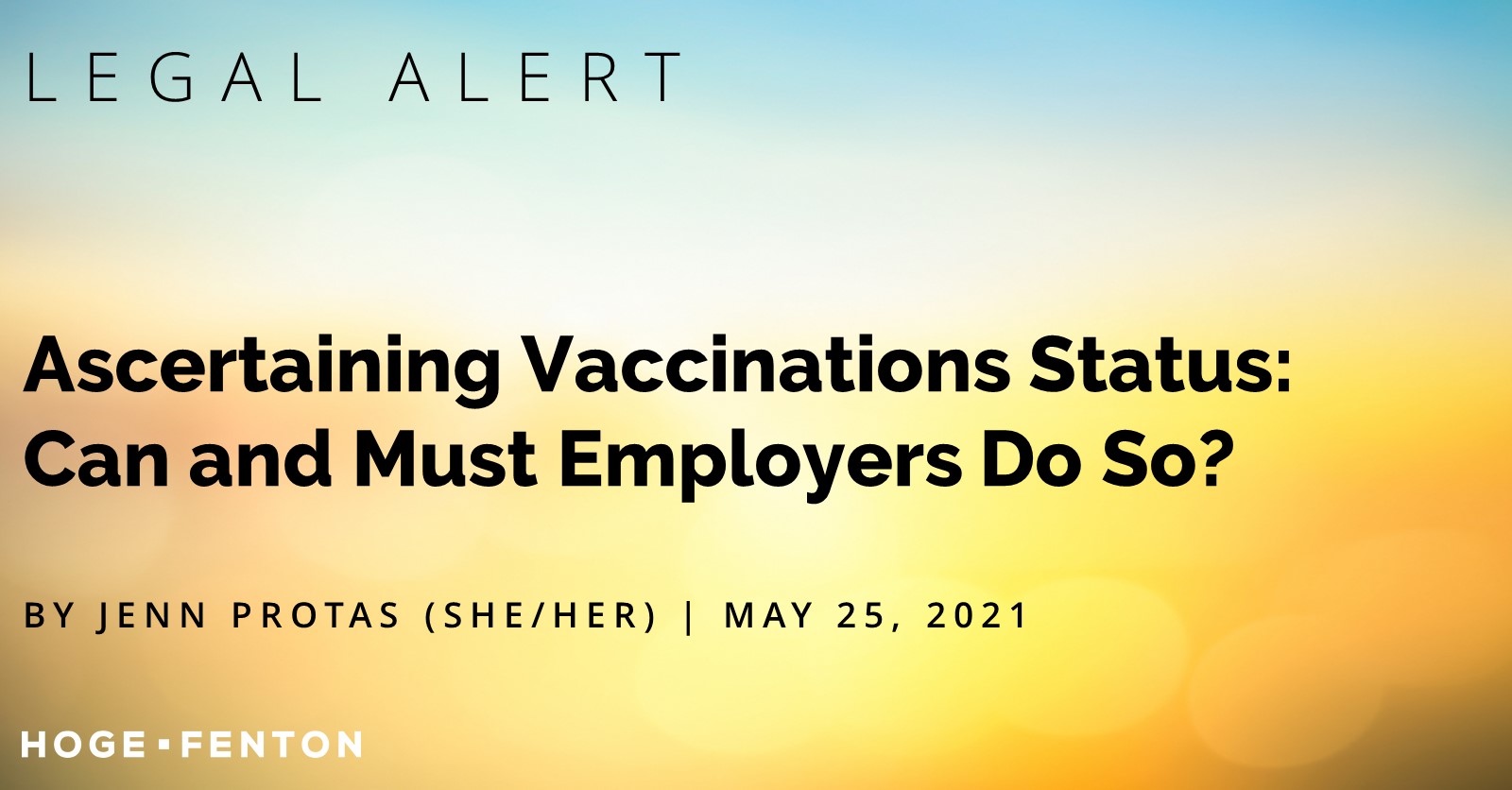Ascertaining Vaccinations Status: Can and Must Employers Do So?
By Hoge Fenton | 05.25.2021 | Employment Law

On Tuesday, May 18, Santa Clara County moved to the Yellow Tier of California’s Blueprint for a Safer Economy. In doing so, the County Health Officer issued a new order (with accompanying FAQs) establishing focused safety measures to protect the community from COVID-19 (“the Order”). Among other things, the Order no longer requires businesses to maximize teleworking, eliminates local rules related to capacity, and eliminates the requirement that businesses submit Social Distancing Protocols to the County Public Health Department. However, state rules, including the Cal/OSHA’s COVID-19 Emergency Temporary Standards1, still apply.
Making news is the unexpected requirements by the County that businesses ascertain the vaccination status of all personnel, including employees, contractors, sub-contractors, independent contractors, vendors, volunteers, and other individuals who regularly provide services onsite at the request of the business. The Order requires businesses to ascertain vaccination status of personnel within 14 days of the effective date of the Order—by June 1. Thereafter, businesses must obtain updated vaccination status for all personnel who were not fully vaccinated every 14 days.
Unvaccinated personnel and personnel who decline to provide vaccination status must comply with the Mandatory Directive on Use of Face Coverings and all applicable provisions of the Health Officer’s Mandatory Directive on Unvaccinated Personnel. As such, unvaccinated personnel must continue to wear face coverings at the worksite, must be excluded from the workplace if they’ve been in “close contact” to a confirmed case or have been confirmed to have COVID-19, and must be provided with information on how to get vaccinated2. The County provides a compliant information sheet that businesses can use for this purpose. The Health Officer also urges businesses to require unvaccinated personnel to obtain weekly PCR testing for COVID-19 or daily antigen testing with COVID PCR confirmation of any positives.
Businesses must maintain a written record of their efforts to ascertain vaccination status of their personnel by either (1) confirming their visual review of vaccination documentation, or (2) gathering self-certifications from personnel. The County provides a sample Certification Form that businesses can use to ascertain vaccination status. The form gives employees the option to decline to provide that information, in which case employers must treat such employees as unvaccinated personnel. Businesses must treat these records as confidential medical records.
Failure to comply may result in fines up to $5,000 per violation per day.
Although this requirement is currently a Santa Clara County requirement only (i.e., neither the state nor any other county in the Bay Area has imposed requirements to ascertain vaccination status of personnel), we have seen throughout the pandemic that other counties are likely to follow suit.
Even without a mandate to do so, many employers may choose to ascertain vaccination status of their employees and contractors, and doing so is permissible. It is not a violation of the Health Insurance Portability and Accountability Act (HIPAA), the Americans with Disabilities Act (ADA), or the California Fair Employment and Housing Act (FEHA) to request vaccination status or require proof of vaccination. That said, employers should not ask why employees decline to get vaccinated or share vaccination status. Asking employees why they are not vaccinated or why they decline to share their vaccination status could elicit disability-related information, and, as such, those inquiries are not permitted by the ADA or FEHA. Employee vaccination status should be treated as confidential.
Of course, some businesses are concerned about treating vaccinated and unvaccinated employees differently. Such differential treatment is not based on a protected class (so long as you are treating all unvaccinated personnel equally) and is based on employers’ efforts to keep their employees and the public safe. Therefore, it is permissible to treat vaccinated employees differently if following federal, state, and local guidance in doing so. That said, even when no longer required to enforce mask mandates by state or local laws, businesses are permitted to continue to require all employees to wear face coverings and maintain social distance while at the worksite, regardless of vaccination status.
For more information or resources regarding COVID-related laws applicable to employers and/or employees, please refer to Hoge Fenton’s Employment Law Group’s resource page, or contact a member of the Employment Law Group.
1Cal/OSHA was set to vote on new rules in workplace settings on May 20, but the vote was postponed to June 3. While the state has indicated its intention to adopt the new CDC guidance to allow fully vaccinated Californians to go without face coverings in most indoor settings outside of workplaces when the state fully re-opens (planned tentatively for June 15), the Cal/OSHA Emergency Temporary Standards are still in effect for workplace settings until changed by Cal/OSHA.
2Until the Cal/OSHA and the California Department of Public Health modify requirements, vaccinated personnel must also still wear face coverings in the workplace.
Our Employment Law Group
 |
Jenn Protas (she/her) helps employers navigate California’s numerous employment laws and defends employers with an eye toward successful, yet cost-effective resolution. Jenn is a committed advocate for her clients and a tenacious litigator. She defends employers on matters related to wage and hour law, wrongful termination, harassment, discrimination, and retaliation in single-plaintiff litigation, Private Attorney General Act actions, and/or class actions. Jenn’s practice also includes housing discrimination matters and business litigation. |
 |
Sarju Naran (he/him) is a zealous advocate for his clients and approaches litigation with creativity and strategy. Chair of Hoge Fenton’s Employment Law Group, Sarju’s experience spans from representing middle-market and family-owned closely held businesses to large multi-national companies. He regularly litigates and provides advice and counsel to companies on wage and hour issues, trade secret misappropriation, employee mobility, wrongful termination, performance management, and leaves of absence. |
 |
Maysa Saeed (she/her) is an associate attorney whose practice focuses on employment counseling and litigation and assists clients in all aspects of employment law. Prior to joining Hoge Fenton, Maysa was a litigation associate with experience litigating various commercial, employment, and real estate matters. Maysa’s prior legal experience also includes defending insurance carriers in administrative trials before the Workers’ Compensation Appeals Boards in San Jose and Salinas. |
This information is provided as an educational service by Hoge Fenton for clients and friends of the firm. This communique is an overview only, and should not be construed as legal advice or advice to take any specific action. Please be sure to consult a knowledgeable professional with assistance with your particular legal issue. © 2021 Hoge Fenton









